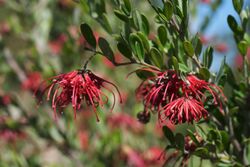Biology:Grevillea speciosa
| Grevillea speciosa | |
|---|---|

| |
| Scientific classification | |
| Kingdom: | Plantae |
| Clade: | Tracheophytes |
| Clade: | Angiosperms |
| Clade: | Eudicots |
| Order: | Proteales |
| Family: | Proteaceae |
| Genus: | Grevillea |
| Species: | G. speciosa
|
| Binomial name | |
| Grevillea speciosa (Knight) McGill.[1]
| |
Grevillea speciosa, commonly known as red spider flower,[2] is a species of flowering plant in the family Proteaceae and is endemic to the Central Coast of New South Wales. It is an erect shrub with elliptic to egg-shaped or more or less circular leaves and more or less spherical, downturned clusters of red flowers.
Description
Grevillea speciosa is an erect shrub that typically grows to a height of 0.4–3 m (1 ft 4 in–9 ft 10 in), its branchlets covered with silky to shaggy hairs. The leaves are elliptic to egg-shaped with the narrower end towards the base, or more or less circular, mostly 10–40 mm (0.39–1.57 in) long and 4–12 mm (0.16–0.47 in) wide with the edges turned down. The lower surface of the leaves is silky to softly-hairy. The flowers are arranged in large, downturned, dome-shaped to spherical clusters 20–40 mm (0.79–1.57 in) long, the flowers red, rarely pink or very rarely cream-coloured. The pistil is 25–35 mm (0.98–1.38 in) long and the style is gently curved. Flowering mainly occurs from July to October, and the fruit is an elliptic to narrowly oval follicle 12–20 mm (0.47–0.79 in) long.[2][3][4][5]
Taxonomy
This species was first formally described in 1809 by Joseph Knight who gave it the name Lysanthe speciosa in On the cultivation of the plants belonging to the natural order of Proteeae.[6] In 1975, Donald McGillivray moved it to the genus Grevillea as Grevillea speciosa in the journal Telopea.[7][8] The specific epithet (speciosa) means "showy".[4]
Distribution and habitat
Red spider flower grows on ridgetops and hillsides in moist heath, low woodland and forest in sandy soil from Gosford, Kulnura and Bucketty to just south of Port Jackson on the central coast of New South Wales.[2][3][5]
References
- ↑ "Grevillea speciosa". Australian Plant Census. https://biodiversity.org.au/nsl/services/apc-format/display/63737.
- ↑ 2.0 2.1 2.2 Makinson, Robert O.. "Grevillea speciosa". Royal Botanic Garden Sydney. https://plantnet.rbgsyd.nsw.gov.au/cgi-bin/NSWfl.pl?page=nswfl&lvl=sp&name=Grevillea~speciosa.
- ↑ 3.0 3.1 "Grevillea speciosa". Australian Biological Resources Study, Department of Agriculture, Water and the Environment: Canberra. https://profiles.ala.org.au/opus/foa/profile/Grevillea%20speciosa.
- ↑ 4.0 4.1 Wrigley, John W.; Fagg, Murray A. (1991). Banksias, waratahs & grevilleas : and all other plants in the Australian Proteaceae family. North Ryde, NSW, Australia: Angus & Robertson. p. 333. ISBN 0207172773.
- ↑ 5.0 5.1 Benson, Doug; McDougall, Lyn (1999). "Ecology of Sydney plant species: Part 7a Dicotyledon families Nyctaginaceae to Primulaceae". Cunninghamia 6 (2): 1076. https://www.biodiversitylibrary.org/item/299412#page/1092/mode/1up. Retrieved 16 February 2023.
- ↑ "Lysanthe speciosa". APNI. https://id.biodiversity.org.au/instance/apni/528469.
- ↑ "Grevillea speciosa". APNI. https://id.biodiversity.org.au/instance/apni/469880.
- ↑ McGillivray, Donald (1975). "Australian Proteaceae:New Taxa and Notes". Telopea 1 (1): 24. https://www.biodiversitylibrary.org/item/313228#page/32/mode/1up. Retrieved 16 February 2023.
External links
Wikidata ☰ Q5228404 entry
 |


